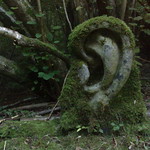 I work on a university campus where incidents of bias and racism occurred last fall (and still continue to occur), drawing the eyes of our campus community, our regional community, and the world on us (USA Today article). Last fall, these incidents caused fear on the campus. Students did not feel safe, especially since it wasn't clear who was leaving racist messages in various campus buildings. Students began protesting and demands were made of the administration. The administration accepted most of the demands, but could not accept all as they were written due to legal reasons. Then came the December holidays. Students promised to continue protesting in the spring semester, and they have. At issue is how the administration continues to handle itself and the feeling that nothing is changing. Students are angry. Yes, I have just provided a simplified description of what is occurring and in reality it is much more complex. For an up-to-date picture of what is happening, check the hashtag #NotAgainSU on social media (e.g., Twitter).
I work on a university campus where incidents of bias and racism occurred last fall (and still continue to occur), drawing the eyes of our campus community, our regional community, and the world on us (USA Today article). Last fall, these incidents caused fear on the campus. Students did not feel safe, especially since it wasn't clear who was leaving racist messages in various campus buildings. Students began protesting and demands were made of the administration. The administration accepted most of the demands, but could not accept all as they were written due to legal reasons. Then came the December holidays. Students promised to continue protesting in the spring semester, and they have. At issue is how the administration continues to handle itself and the feeling that nothing is changing. Students are angry. Yes, I have just provided a simplified description of what is occurring and in reality it is much more complex. For an up-to-date picture of what is happening, check the hashtag #NotAgainSU on social media (e.g., Twitter).Someone this past week reminded me that protests are not the first reaction to a problem, rather a protest is what happens when a situation has gone unresolved for a long time. Racism is a situation that has been protested for a long time. In the U.S., racism continues to be a problem in our our communities, including on college campuses. Its roots can be traced through making "other" those that are perceived as different, Jim Crow, as well as white and protestant supremacy. Gains have been made, including during the era of Reconstruction after the Civil War, but racism has stayed with us. Many groups, including the Poor People's Campaign, continue to struggle against systematic racism.
There is No Magic Wand
And that is what makes this situation tough. Nothing can happen immediately to make this situation better, either here at Syracuse University or in another community. There is one thing, however, that is not being done which could make a positive impact and that is listening...really listening. Real listening means listening to the words being said, as well as what is not being said. It is paying attention to body language. It means being fully present and not distracted. It means seeking to understand, which takes time and perhaps a number of different listening sessions.I believe that no one is fully listening in this situation. Listening fully takes more time that each side is investing in that activity currently. It would mean listening to people across campus, in all of the different schools, including 22,800+ students, 3,500+ staff, and 2,000+ full-time and part-time faculty. It would mean holding listening sessions in every building on our 721 acres campus, as well as SU facilities in other parts of the world. With some of our students taking classes online, it would also mean holding listening sessions through online platforms. No matter how you think about it, that would all take time to ensure that everyone has had an opportunity to be heard. Those who are listening - a mix of administrators, staff, faculty, and students, as well as perhaps outside observers - would need to verify their understand, and that would take time, too.
Are You Listening to Your Coworkers and Colleagues?
Inadequate listening happens everywhere and all the time, not just at SU. Thinking of your situation, perhaps better questions are:- Do you know how to listen?
- When was the last time you listened without using that time to construct a response?
- When have you listened, then asked questions to clarify what you heard?
- When was the last time you said something like, "What I am hearing you say is..."
Resources
There are many resources on listening, including articles, books and workshops, and below are just a few. While you will learn from reading these materials, you will need to practice, practice, practice. Please don't be afraid to tell people that you are learning how to listen. I think they would be happy to know that you value them so much that you want to hear them better.- 9 Ways to Master the Art of Listening
- The Antidote to Anger and Frustration
- Effective Listening & Aphorisms
- The Art Of Listening Well
- The (lost) art of listening
- From Heather Plett - while these are not about listening, they are related and worth reading.
1 comment:
Lovely post, Jill--as usual. #ImListening
Post a Comment